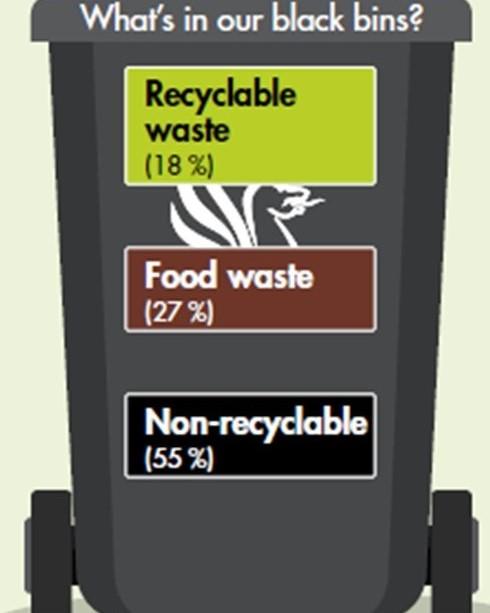The council introduced weekly kerbside recycling collections of a wide range of materials including food waste in 2010. However, an analysis of the waste North Somerset households put in their black bins found that almost half (45 per cent) could have been recycled.
Earlier this year, the council undertook a comprehensive seven-week public consultation, to understand the impacts of any changes to non-recyclable (black bin) waste collections and ask residents how its waste and recycling collection services could be improved to make it easier for households to recycle more.
Final proposals for consideration by North Somerset Council’s Executive have been drawn up based on feedback to the public consultation. This includes 9,105 responses to an online and paper-based questionnaire, as well as conversations from 12 face-to-face engagement events held across North Somerset.
The proposed changes to help North Somerset households recycle more include the weekly collection of soft plastics (such as crisp packets and vegetable packaging), a new container for cans and other plastics, and the switch from a fortnightly to a three-weekly collection of black bins. If approved, any changes would be introduced in phases in 2025.
A team of waste minimisation officers will be available to advise households who may have concerns about any changes and need more support to recycle as much as they can. People who may struggle with a three-weekly black bin collection due to medical needs or having a large family would receive additional support, and if necessary a slightly different solution could be put in place for that household.
Cllr Annemieke Waite, North Somerset Council’s executive member for waste, said: “If approved, these changes will deliver three key benefits. They will cut the cost to council taxpayers of waste disposal. They will boost further our recycling rates, which are already amongst the best, including introducing kerbside recycling of soft plastics. The plans will also provide additional support to households least able to manage their waste, including advice and bigger bins where that is needed.
“We want to make North Somerset a thriving and sustainable place to live, work and visit. This year, we will need to spend around £5 million to dispose of black bin rubbish, but almost half of this waste could instead be recycled and generate an income to help pay for vital local services.
“Many people are supportive and enthusiastic about recycling as much as possible, putting out their sorted recycling, including food waste, each and every week, and for these households a change in frequency of black bin collections will not be a concern.
“However, we know some would find it harder to adapt to a reduction in frequency of black bin collections. If the proposed changes are implemented, we would have measures in place to support these households through the changes, and if needed find an alternative solution.”
Treating and disposing of black bin rubbish costs local council tax payers around £130 per tonne. North Somerset Council’s separated kerbside recycling collections result in a high quality of recycling material, which can be sold and made into new materials. This generates an income of around £30 per tonne.
Last year households in North Somerset generated a total of approximately 90,000 tonnes of waste, 40,000 tonnes of which was put in black bins. 18,000 tonnes of this could have been recycled instead, cutting emissions and saving money.
The proposed changes to waste and recycling collection services would generate an estimated saving of £1.1m a year for North Somerset Council. This would be a combination of reduced costs of black bin rubbish disposal as well as an increase in revenue from the sale of the additional recyclable materials collected, and would be in line with the council’s recycling and waste strategy.
Cllr Waite added: “Thank you to the thousands of people who took part in our consultation and really helped us understand how we can improve our waste and recycling collections. Alongside the proposed changes, we’re also improving training for collection crews to address issues highlighted in the consultation, such as litter and placement of returned containers.”
Several other local councils in the south west have already successfully made the switch to three-weekly non-recyclable rubbish collections, including Somerset, East Devon, and Mid-Devon. All have seen an increase in recycling rates, a reduction in non-recyclable waste, and a financial saving.
The report containing the proposals is at https://n-somerset.moderngov.co.uk/documents/s6248/10%20Executive%20Committee%20Report_Three%20weekly%20waste%20consultation_17%20Jul%202024_FINAL.pdf.
